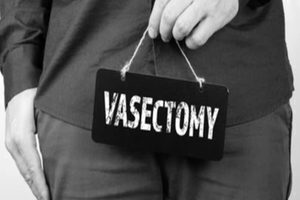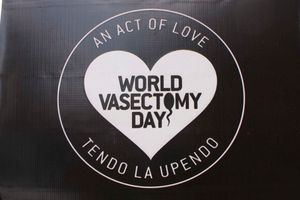Vasectomy: When culture is at war with patient rights

The anaesthetic risk in a vasectomy is eliminated, with lower expected surgical complications.
What you need to know:
- The belief that every African wants to have many children is a fallacy that must be done away with.
- Cultural justifications that continue to hold back uptake of vasectomy severely hinder the right to reproductive health and justice.
- A couple will spend way more resources to get a tubal ligation as compared to the vasectomy; a cost that is seldom covered by third party payers. Further, the anaesthetic risk in a vasectomy is eliminated, with lower expected surgical complications.
About a decade ago, Marie Stopes Kenya started an annual campaign to provide free vasectomy services to men around the country. This was done through medical camps set up in public social halls for a whole week, where men presented themselves, were taken through counselling and were empowered to make an informed choice before giving consent. The surgical procedures were done at no cost to the clients.
The public was quite weary of the services in the first camp, but remarkably, quite a good number of clients took up the service. Subsequent camps have showed a steady increase in demand to a point where the camps are now overrun. This week, the camps take place in Embakasi, Mathare and Makadara. The uptown gentlemen are quietly inquiring when the favour will be subtly extended to the leafy suburbs.
From the medical perspective, the impact of increased uptake of the service is good news. It speaks to the full onboarding of men into the reproductive health services platform, where for many years they have remained as spectators. Further, it adds one more option to the arsenal of options available to couples, not only on paper, but also in actual practice.
However, the bad press regarding the option has still not let up. Vasectomy still has mountains to scale culturally. While women openly discuss their contraceptive options and choices, many men having vasectomies are not comfortable declaring even to their partners that they have undergone the procedure. It is still not ‘vogue’ enough to walk around with a snip in your drawers. This however, does not mean that many men are not considering the option.
Kathie* suffered appendicitis as a child, she underwent surgery but what was considered a minor surgery resulted in seven subsequent surgeries to manage the complications that arose. The surgical team warned that her abdominal anatomy was highly likely very distorted from the recurrent abdominal entry, the severe infections that had to be managed and the repeat surgeries. They implored that in future, in the event that she really had to go under the knife, she was to have it done in a hospital with capacity for multidisciplinary care, to handle complications.
Kathy was lucky to go through a fairly unremarkable process in pregnancy and childbirth twice. Together with her husband Saul, they made a decision that the two babies were all they needed to complete their family. They did not want to take the risk of Kathy ever going under the knife because of an emergency caesarian section. Attempts at use of modern contraceptive methods did not succeed. The side effects she experienced made her opt out. It was time to think of a permanent option.
As we sat and walked through Kathy’s history, it was clear that surgery for her was not a good idea. The risk involved was just too high. It was time to look elsewhere. Saul was more than ready to go under the knife, but on one condition, this was to remain between them. He did not want to deal with backlash from his family. Saul had read and consulted widely with regard to vasectomy. He knew that the cost of a tubal ligation was at least five times higher than that of a tubal ligation. Further, the risk was not even comparable.
Cultural justifications that continue to hold back uptake of vasectomy severely hinder the right to reproductive health and justice. A couple will spend way more resources to get a tubal ligation, as compared to the vasectomy; a cost that is seldom covered by third party payers. Further, the anaesthetic risk in a vasectomy is eliminated, with lower expected surgical complications.
Away from vasectomy, women face even more difficult hurdles in an effort to get permanent sterilisation. Despite the constitutional rights to autonomy, further extrapolated in Ministry of Health family planning policies and guidelines, we are yet to wrap our heads around the fact that we need to stop enforcing our personal opinions, informed by our own cultural biases, down our client’s throats.
The belief that every African wants to have many children is a fallacy that must be done away with. The fact that a couple may live to regret the decision made to go down the permanent sterilisation route is not an excuse to deny them full disclosure and support the informed decision they may take. The expectation that every single person aspires to be a parent in future is fast being deconstructed by many men and women in their 40s and 50s who chose the unpopular pathway and have lived to tell their story.
Health care workers are even worse when they bring their biases and cultural beliefs into their work, and inadvertently deny patients their rights; yet they are the ones expected to hold fort, remain neutral and uphold patient rights.
Health workers are human. They too have the right to autonomy. They are allowed to express their misgivings about a patient’s choices. The one thing they are not permitted to do is to impose these misgivings. However, they fully retain their right to conscientious objection. This allows them to refer the client for care under someone else, with no misgivings.
Every pregnancy is a risk to a woman’s life, whether it is planned or inadvertent. Contraception has been recognised as a key contributor to the prevention of maternal morbidity and mortality. A non-pregnant women cannot be a potential victim of postpartum haemorrhage, eclampsia or sepsis. A vasectomy is the single most powerful way a man can contribute to the prevention of maternal morbidity and mortality. Let us allow our men to rise to the occasion without bias!
Dr Bosire is an obstetrician/ gynaecologist





